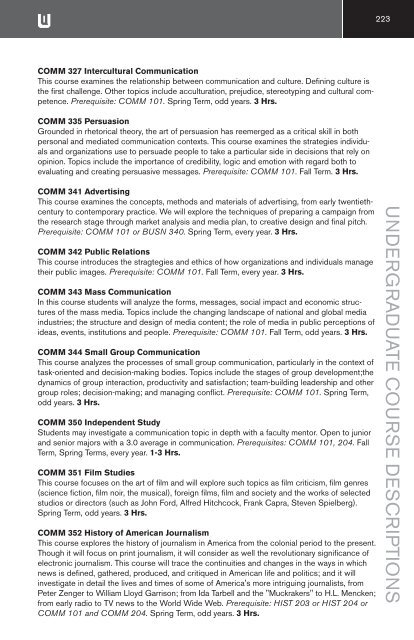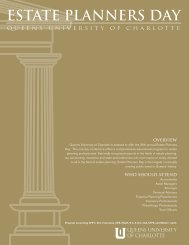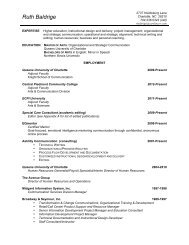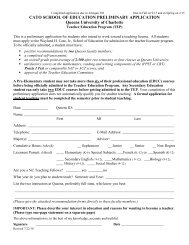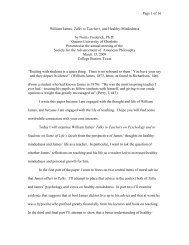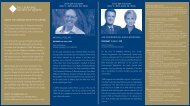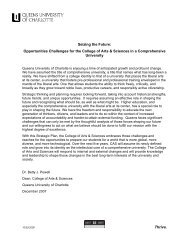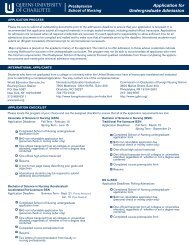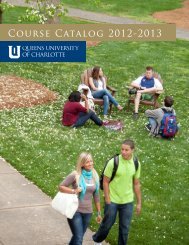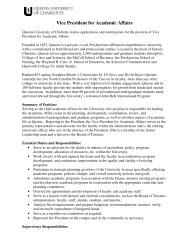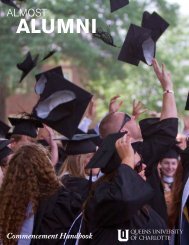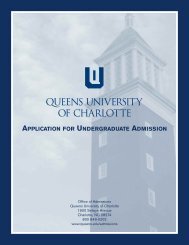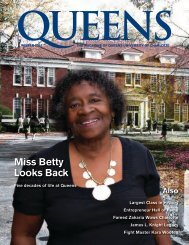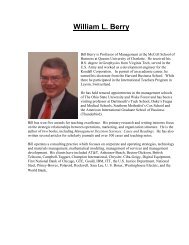2008-2009 Academic Catalog - Queens University of Charlotte
2008-2009 Academic Catalog - Queens University of Charlotte
2008-2009 Academic Catalog - Queens University of Charlotte
You also want an ePaper? Increase the reach of your titles
YUMPU automatically turns print PDFs into web optimized ePapers that Google loves.
223<br />
COMM 327 Intercultural Communication<br />
This course examines the relationship between communication and culture. Defining culture is<br />
the first challenge. Other topics include acculturation, prejudice, stereotyping and cultural competence.<br />
Prerequisite: COMM 101. Spring Term, odd years. 3 Hrs.<br />
COMM 335 Persuasion<br />
Grounded in rhetorical theory, the art <strong>of</strong> persuasion has reemerged as a critical skill in both<br />
personal and mediated communication contexts. This course examines the strategies individuals<br />
and organizations use to persuade people to take a particular side in decisions that rely on<br />
opinion. Topics include the importance <strong>of</strong> credibility, logic and emotion with regard both to<br />
evaluating and creating persuasive messages. Prerequisite: COMM 101. Fall Term. 3 Hrs.<br />
COMM 341 Advertising<br />
This course examines the concepts, methods and materials <strong>of</strong> advertising, from early twentiethcentury<br />
to contemporary practice. We will explore the techniques <strong>of</strong> preparing a campaign from<br />
the research stage through market analysis and media plan, to creative design and final pitch.<br />
Prerequisite: COMM 101 or BUSN 340. Spring Term, every year. 3 Hrs.<br />
COMM 342 Public Relations<br />
This course introduces the stragtegies and ethics <strong>of</strong> how organizations and individuals manage<br />
their public images. Prerequisite: COMM 101. Fall Term, every year. 3 Hrs.<br />
COMM 343 Mass Communication<br />
In this course students will analyze the forms, messages, social impact and economic structures<br />
<strong>of</strong> the mass media. Topics include the changing landscape <strong>of</strong> national and global media<br />
industries; the structure and design <strong>of</strong> media content; the role <strong>of</strong> media in public perceptions <strong>of</strong><br />
ideas, events, institutions and people. Prerequisite: COMM 101. Fall Term, odd years. 3 Hrs.<br />
COMM 344 Small Group Communication<br />
This course analyzes the processes <strong>of</strong> small group communication, particularly in the context <strong>of</strong><br />
task-oriented and decision-making bodies. Topics include the stages <strong>of</strong> group development;the<br />
dynamics <strong>of</strong> group interaction, productivity and satisfaction; team-building leadership and other<br />
group roles; decision-making; and managing conflict. Prerequisite: COMM 101. Spring Term,<br />
odd years. 3 Hrs.<br />
COMM 350 Independent Study<br />
Students may investigate a communication topic in depth with a faculty mentor. Open to junior<br />
and senior majors with a 3.0 average in communication. Prerequisites: COMM 101, 204. Fall<br />
Term, Spring Terms, every year. 1-3 Hrs.<br />
COMM 351 Film Studies<br />
This course focuses on the art <strong>of</strong> film and will explore such topics as film criticism, film genres<br />
(science fiction, film noir, the musical), foreign films, film and society and the works <strong>of</strong> selected<br />
studios or directors (such as John Ford, Alfred Hitchcock, Frank Capra, Steven Spielberg).<br />
Spring Term, odd years. 3 Hrs.<br />
COMM 352 History <strong>of</strong> American Journalism<br />
This course explores the history <strong>of</strong> journalism in America from the colonial period to the present.<br />
Though it will focus on print journalism, it will consider as well the revolutionary significance <strong>of</strong><br />
electronic journalism. This course will trace the continuities and changes in the ways in which<br />
news is defined, gathered, produced, and critiqued in American life and politics; and it will<br />
investigate in detail the lives and times <strong>of</strong> some <strong>of</strong> America's more intriguing journalists, from<br />
Peter Zenger to William Lloyd Garrison; from Ida Tarbell and the "Muckrakers" to H.L. Mencken;<br />
from early radio to TV news to the World Wide Web. Prerequisite: HIST 203 or HIST 204 or<br />
COMM 101 and COMM 204. Spring Term, odd years. 3 Hrs.<br />
UNDERGRADUATE COURSE DESCRIPTIONS


